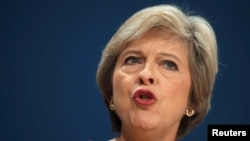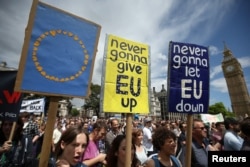For Prime Minister Theresa May, Britain's vote to leave the European Union is a demand for the biggest change in at least a generation in the way the United Kingdom is run.
This week, May cast the Brexit vote as a "quiet revolution" that exposes the failings of modern Britain in a way that can no longer be ignored by a leader who looks to Margaret Thatcher, Winston Churchill and Clement Attlee for inspiration.
The prime minister promised fundamental — though yet to be detailed — reforms to fix problems ranging from arrogant elites and venal bosses to workers' rights, immigration and Britain's obsession with privilege.
"This is a turning point for our country, a once-in-a-generation chance to change the direction of our nation for good," May told members of her ruling Conservative Party.
"Change has got to come, too, because of the quiet revolution that took place in our country just three months ago — a revolution in which millions of our fellow citizens stood up and said they were not prepared to be ignored anymore," she said.
Britain's needs
May, who said the poor had made the biggest sacrifices since the 2008 global financial crisis, said Britain needed selective schools to help talented poor students, a new industrial strategy, workers on company boards and more house building.
The 60-year-old former interior minister won the top job in the turmoil that followed the June 23 Brexit vote, despite having been a low-key supporter of the "remain" camp.
May is an unlikely radical, but her words indicate she plans some of the biggest changes to British society since Thatcher's 1979-90 premiership, even as she embarks on one of the most complex negotiations in recent European history: Britain's EU exit.
To be sure, May was speaking to her own party faithful while staking her claim to the so-called "center ground" of British politics by pocketing policies and rhetoric from rivals such as Labor and the United Kingdom Independence Party.
May, a vicar's daughter, was also seeking to unite a country whose divisions were laid bare by the referendum, in which England and Wales voted to leave the EU while Scotland and Northern Ireland did not. Scotland has said the outcome could prompt a second Scottish independence referendum.
In her speech, as is customary for a Conservative leader, May praised free markets, free trade and the father of modern conservatism, 18th-century British politician Edmund Burke. But she also sketched out new ideas that would, if successful, undo 30 years of British political thinking by putting the state firmly back in the hot seat as the initiator and arbiter of change.
'Force for good'
"Government can and should be a force for good," she said, using language more associated with the opposition Labor Party. "We should employ the power of government for the good of the people."
"The state exists to provide what individual people, communities and markets cannot," May said, invoking Attlee's postwar reforming Labor administration and adding that she would use social reform to build "a society based on fairness."
That is a sharply different vision of Britain than the one set out by almost all of her predecessors since Thatcher, who once declared there is "no such thing as society."
May even had some advice for Mark Carney, the governor of the Bank of England, on the pain of low interest rates and quantitative easing. The Sun newspaper said in an editorial that May's aim was "to reboot Britain" and praised her for huge ambition but cautioned that she should not build a more expensive state.
But many in Britain will be skeptical about May's ability, especially given her small parliamentary majority, to deliver on her promises. Labor lawmaker John Mann said she lacked a mandate to do so, having yet to win an election as prime minister.
"She is overstating her position by claiming Brexit gives her a mandate for all this change," he said. "She does not have a mandate — she is chronically lacking one."






